- Home
- Kelley Armstrong
The Unquiet past Page 7
The Unquiet past Read online
Page 7
He gave her a look. “Yes, I know I could use a shower. They’re a little hard to come by out here. But I’m not—”
She handed him her makeup compact. He saw his face in the mirror and let out a curse. Dirt streaked one cheek, and a smear of it crossed his forehead. He pocketed the mirror and, without a word, took a bar of soap from his pack. Then he grabbed a collapsible jug of water from the table and headed outside. Tess followed.
The boy stripped off his jean jacket, leaving his shirt on, and washed his bare arms with soap and water. Then he rubbed his hair between his fingers with another curse, as if only now realizing how badly it needed shampoo. He looked at the water jug, seeming to consider whether he could spare enough. She was about to say they didn’t have time for that when he dumped half of it on his head and used the soap to lather it up.
“You should have told me how bad I looked,” he said. “Before I went into town for breakfast. No wonder the boulanger wanted to run me out of his place.”
Tess bit her tongue and said only, “Do you have a towel? I can grab it—”
“Don’t have one,” he said as he rinsed his hair. “You?”
“No.”
“You should get your bag anyway. Put it inside. I’m not going to steal any of your clothes—I doubt they’re my size. Or color.”
“I don’t have a bag.”
“What?” He swiped his wet hair out of his face and peered at her. “What did you do? Just drop everything and come out here?”
She considered saying yes, that’s exactly what she’d done, but she could tell he’d think her an idiot, and perhaps that shouldn’t matter, but it did. It always did.
“I brought one. It’s just…not here. I had…a problem, and I had to leave it.”
His eyes narrowed. “Problem?”
She fussed with the scarf in her hair. “I might be able to get it back later. I’m fine for now. We should get going.”
He squeezed out his hair and tugged his jacket back on. They started down the driveway.
“We’ll need a story,” she said. “Who we are to each other. In case anyone asks.”
“None of their business.”
“That’s not going to encourage them to talk to us.”
“I thought we were just going for a pry bar.”
“And to ask questions, of course, while we’re there. What this place is. Was.” She glanced at him. “You seemed to have a theory.”
He shrugged.
“You think it has to do with those books.”
Another shrug.
“An asylum. That’s what you’re thinking, isn’t it?”
An asylum. For crazy people. That’s where her address had led. Not to a home, to a family. To the worst possible answer. That her greatest fear wasn’t unfounded. That somehow, she’d come from this. From madness.
“It’s called a psychiatric hospital,” the boy said, his voice gentler than she’d heard it. “It’s for people with mental illnesses. Illnesses.”
“Where they lock them in tiny rooms without even a window?”
“For their own safety. And even if it was a psychiatric hospital, that has nothing to do with you or your past. It’s a house. Other people have lived there. Probably your family at some point.” He seemed to struggle for something nice to say. “It’s a fancy house. Your family would have been rich. Important.”
She said nothing. He was wrong. Her nightmares and visions couldn’t be a coincidence. If anyone in her family had lived here, it wasn’t because her family owned the house; it was because someone in that family had been a patient. Whatever illness he or she had, it had been passed on to her, and it was deep in her brain, ticking like a bomb, getting ready to explode and—
“So what’s this story you think we need to tell?” he said.
She blinked, reorienting herself. “Cousins.”
“What?”
“With a boy and a girl of our age, they’ll figure we’re dating, and they won’t like that, us being on the road together alone. So cousins. I was given the address for the house and told it would answer some questions about my parents, who died when I was little. As my cousin, you’re here to help with my language barriers.”
He considered, as if looking for holes to poke in her story. Was he disconcerted when he found none? Maybe. He said nothing, though, just kept walking.
She continued. “And since it will no longer be just the two of us, I’ll need a name for you. It can be fake.”
Silence.
“How about Ringo?” she said.
A hard look. “Don’t tell me you’re one of those girls. The Beatles are coming to Montreal in September, and I’m already planning to be out of the province. I remember when they announced the concert—I swear I heard girls screaming from a mile away.”
“The Beatles are all right. I like the Stones better.”
His eyebrows arched, as if shocked that a small-town girl knew who the Rolling Stones were.
“I could call you Mick,” she said.
“No, you could not.” A few more steps. “It’s Jackson.”
“I need a first name.”
A glower. “That is my first name.”
“So what do you go by? Jack?”
“No.”
“Sonny?”
A more emphatic “No.” Then: “If my parents had wanted to call me Jack or Sonny, that’s what my name would be. It’s Jackson.”
“Huh. That’s different.”
“So I’ve heard.”
He walked on quickly, leaving her jogging to catch up.
“It’s not French,” she said.
“No kidding.” A few more steps, then: “I’m named after the painter, if you must know.”
“Jackson Pollock?”
Again, he seemed surprised that she knew him. He nodded. “My mother met him when she was a kid, and I guess he made an impression. Good enough? Or are you going to keep interrogating me?”
“It’s not interrogation. It’s curiosity. And since you seem perfectly fine with ignoring my questions, I feel perfectly fine with asking them.”
He sighed, and they continued on.
“No one lives there,” the woman at the hardware store said. She spoke French as Tess struggled to mentally translate.
“Obvious—” Jackson began irritably before Tess cut him short with a kick. She was beginning to think her broken French might be more useful than having him speak for her.
“You aren’t hanging around up there, are you?” the woman asked. “Didn’t you see the signs?”
“We only went up to have a look,” Jackson lied. “It was empty and obvious—” He stopped himself. “And it didn’t seem as if anyone lived there. How long has it been empty?”
“Sixteen years.”
“What?” Tess interjected in English. Then a quick “pardonnez-moi” to the woman and to Jackson, “Can you ask if she’s sure? That’s before I went to the Home.”
Jackson asked. The woman was certain—her sixteen-year-old daughter was born the summer after the last owners left.
“So it’s been abandoned for sixteen years?” Jackson asked.
“Empty, not abandoned,” the woman said. “It’s still owned by someone. There’s a caretaker.”
“Can we get his address?” Tess cut in, asking in French and adding a heartfelt “s’il-vous-plaît.”
“Oui.”
Before they left to find the caretaker, Jackson asked the woman what the house had been used for. No one in town knew exactly, she said. All they had figured out was that it had been occupied by a group rather than a family. There had been a barbed-wire fence surrounding the grounds, and locals had been asked, very nicely, not to hunt or otherwise trespass. The man in charge had seemed to be a doctor, and in explaining the need for privacy, he’d mentioned patients. Locals guessed it was some kind of sanatorium or private hospital.
The caretaker turned out to be younger than Tess had expected. Maybe in his early twenties. He worked as th
e local plumber, having taken over when his father passed on two years ago.
“That’s when I took on the house too,” he said. “It used to be my dad’s responsibility.”
“How long did he do it?” Jackson asked.
“Since the folks up there moved out. The doctors or whatever. I was about eight, so…sixteen, seventeen years ago?”
Jackson asked more pointed questions about the type of doctors, but the young man knew nothing more. “There were stories,” he said. “Especially about this one guy, who snuck up there on a dare at a bonfire party. He got teased because he was so scared when he came back. But I was little at the time. Maybe six. The kids involved were teenagers. So I don’t know what he saw. You’d need to ask him.”
He gave them the man’s address, and then Jackson asked more about the house and the caretaking responsibilities. As they might have guessed from the look of the place, his job wasn’t to keep it in move-in condition. His main task was just enough basic upkeep to avoid violating any laws and having the house condemned. The occasional group of local teens would throw a party there—he admitted to doing that himself when he was younger—but they usually cleaned up afterward and didn’t do any damage, so he turned a blind eye.
He also paid the annual taxes. That money was wired to him, as was his monthly stipend. Both came anonymously.
“I don’t know the owner’s name,” he said. “I’ve never had any contact with him. The deed lists a company in Montreal. I looked it up when I was there once—just curious, you know—but I couldn’t find any record of it.”
Jackson wrote down the name and address of the man who’d trespassed on a dare, and they headed out again.
Twelve
THE MAN THEY needed to speak to lived outside town. When Jackson turned onto his street, Tess slowed. It was the same dirt road the truck had gone down the night before.
“What’s the name of the witness?” she asked.
“Witness?” A short laugh. “You make it sound like—” He caught her look and stopped. “What’s wrong?”
“Nothing. I’m just curious.”
That appraising gaze again. She must have passed muster, because he resumed walking and said, “Etienne.”
French for Steve. Tess exhaled in relief. While she suspected the man in the truck wasn’t really named John, she recalled him saying he’d lived in Ontario for half of his life, which meant he’d go by Steve, not Etienne. If she was to estimate his age, she’d say he was close to forty, meaning he was too old to be the high-school student the young caretaker remembered. Still, she couldn’t help casting anxious glances at the farmhouses they passed, half expecting “John” to appear out of one. Having Jackson there would help. John was unlikely to bother her if she wasn’t alone.
They reached the address. And there, in the drive, was the pickup truck.
If someone had asked Tess before if she’d recognize the vehicle, she’d have said no. She recalled only that it was gray. Or silver. Or maybe even light blue. Now, seeing it again, there was no doubt. This was the truck she’d escaped from the night before.
Tess backed up behind the hedge that concealed the house from view.
“Can you handle this?” she asked.
“What?” Jackson hadn’t seemed to notice her stopping. His expression suggested he’d been deep in thought.
“I…” She struggled for an excuse. Should she warn him? She didn’t know enough about men like John to be sure. It seemed he’d gone after her because she was a girl, not because he’d wanted to rob her—the farmhouse was big and in good repair. The Etienne they were looking for probably wasn’t even John but someone else who lived here. And they did need to speak to this Etienne. He was their only witness, however much Jackson scoffed at the word.
“I think you should handle this by yourself,” she said carefully. “He might not want to discuss it, and we really need to know what he saw at the house, and you’re…better at making people talk.”
He nodded, as if she’d paid him a compliment, then added, “My dad’s a lawyer.”
“Good. So you know how to get information from reluctant…”
“Witnesses?” His lips quirked in what might have been a smile.
“Yes. If you go at him hard, I might be tempted to interfere, like I did in town. It’ll work better if it’s just you.”
“All right.”
“Can you get him outside?” she asked. “So I can listen in?”
With that, his usual annoyance returned, his lips tightening. “I’m perfectly capable of remembering and relaying—”
“It doesn’t seem safe to go into a stranger’s house.” Which, in this case, was the truth. Even if she didn’t think John posed a threat to a teenage boy, she wanted Jackson outside, where she could watch and intervene if necessary.
When she said that, though, he rolled his eyes. “I’m a guy. I’m almost eighteen. I have a knife.”
“Please?”
She expected more eye rolling at that, but to her surprise, he gave her that piercing look and then said, “All right. But only if he comes outside easily.”
Etienne did come out easily. And it was John. Or rather Steve, as he told Jackson, laughingly explaining that the locals had changed his name for him to make him properly French. Jackson suggested they switch to English, which Tess mentally thanked him for. It did make it easier to eavesdrop from her hiding place beside the big front porch.
“I’m interested in a house,” Jackson said.
Steve laughed. “I’m not a real-estate agent. And you look a little young for home ownership.”
“It’s the one on the hill. The abandoned one. Well, empty, I’m told. Not abandoned.”
“Oh.” The ebullience drained from Steve’s voice. “You aren’t hanging around up there, are you?”
“No, but I’m told you did once. Back when it was still occupied.” Jackson wove a quick story about an aunt his mother had lost touch with almost twenty years ago, and the house on Montcalm was the last address they had for her.
“Oh,” Steve said again. That was it. Oh.
“You went up there on a dare, when you were a teenager…”
“Yeah.”
“And you saw…”
“Nothing.”
A missed beat before Jackson said, “Nothing?”
“That’s right.”
When Jackson spoke again, there was a new note in his voice. Authority, as if he really was a lawyer in a courtroom. “I’ve been told otherwise. You went up to that house and—”
“And I didn’t see anything.”
“So you got spooked and ran away after seeing nothing?”
“I didn’t see anything. I heard something. And whoever said I got spooked and ran away—”
“Irrelevant.”
Despite her anxiety at being so close to the man who’d tried to kidnap her, Tess had to laugh at the silence that followed, as Steve undoubtedly wondered whether this kid was a lot older than he looked.
“I’m not interested in what you did,” Jackson said. “Only what you saw. Or in this case, heard.”
“All right.” Steve cleared his throat. “Crying. I heard crying.”
The hair on Tess’s neck prickled.
“Crying?” Jackson said. “You were frightened off by that?”
“I wasn’t—” Steve cut himself short. “It wasn’t just crying. It was sobbing and pleading, and then there was screaming. That didn’t last long. The screaming, I mean. Lights went on, and then I heard footsteps, as if someone was running to stop it. Then it stopped.”
“You heard a woman screaming—”
“A man. The crying was a woman, but the screaming was a man. That’s what freaked me out. Hearing a man scream like that? It was awful. I’ve never heard anything like it before.”
“So you heard a woman crying and pleading, and a man screaming, and someone running to silence him…and you returned to the party and didn’t tell anyone?”
“I’d
been trespassing.”
“You heard screaming. Like someone was being hurt, and—”
“It was some kind of hospital. People are in pain in a hospital, so there would be crying and screaming. That’s normal.”
“If it seemed normal, it wouldn’t have scared you.”
“Look, kid, I answered your questions. We’re done.”
The door banged shut, Steve retreating. Then it creaked open and Steve said, “Hey!” as if Jackson had gone in after him.
“Get the hell out of my—”
“Hold on. What’s this?”
“My, uh, daughter’s suitcase. Also, none of your business.”
“Your daughter’s name is Thérèse?”
Tess froze. Billy had rewritten the luggage tag on her suitcase. Steve must have left the suitcase just inside his door.
“Sure. It’s a nice name.”
“It’s also the name of a friend of mine. Who lost her luggage on the way here yesterday.”
Staying low to the ground, Tess hurried along the porch to the steps and climbed them silently as Steve gave a sheepish laugh. “All right. You got me. I found it outside my place this morning. I do have a daughter, and she was hoping no one would claim it, because there are some nice clothes inside, and she figured if it was left behind, it was trash, but I’ve been telling her we need to turn it in at Sainte-Suzanne. If it’s your friend’s, go ahead and take it and tell her I’m sorry—”
“For what?”
A pause. “Hmm?”
“Sorry for what?”
Another pause, Steve clearly trying to decide how much Jackson knew. “For taking it, of course. She should be more careful with her belongings. I really was going to turn it in. I was just trying to convince my daughter—”
“You don’t have a daughter.”
“Excuse me?”
“There are two pairs of shoes by the door and three coats on the rack. All men’s.”
A strained laugh. “What are you, a detective? Get out of here, kid. Take your friend’s bag—”
“I’ll go as soon as you tell me the truth. Where’d you get the suitcase?”

 The Calling
The Calling Darkest Powers Bonus Pack
Darkest Powers Bonus Pack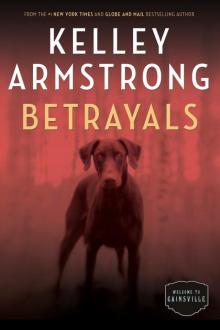 Betrayals
Betrayals Sea of Shadows
Sea of Shadows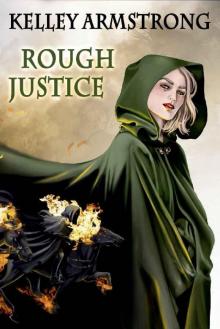 Rough Justice
Rough Justice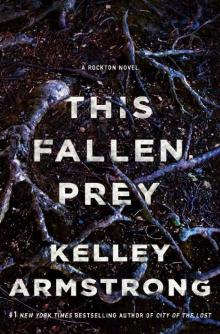 This Fallen Prey
This Fallen Prey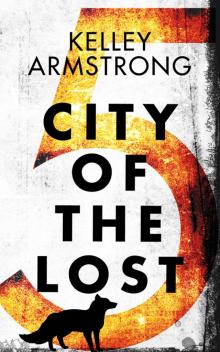 City of the Lost: Part Five
City of the Lost: Part Five Perfect Victim
Perfect Victim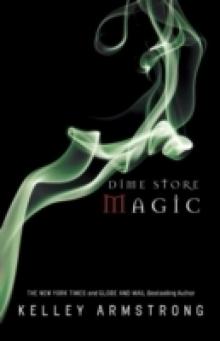 Dime Store Magic
Dime Store Magic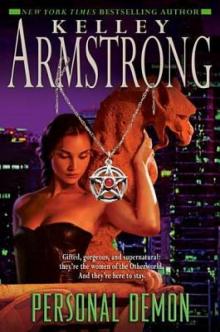 Personal Demon
Personal Demon Haunted
Haunted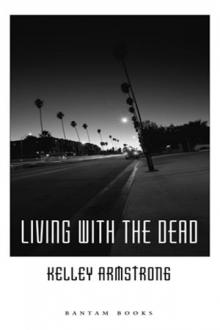 Living With the Dead
Living With the Dead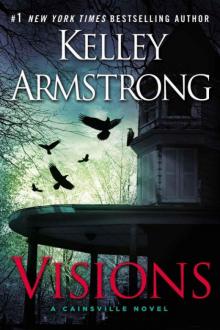 Visions
Visions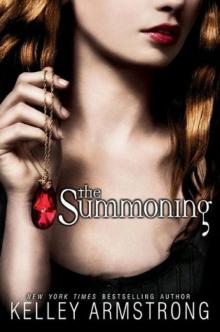 The Summoning
The Summoning Broken
Broken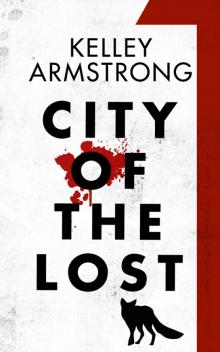 City of the Lost: Part One
City of the Lost: Part One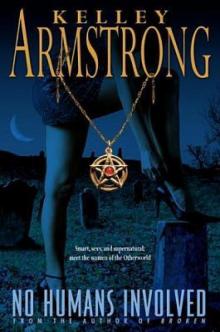 No Humans Involved
No Humans Involved The Awakening
The Awakening The Reckoning
The Reckoning The Gathering
The Gathering Bitten
Bitten Thirteen
Thirteen Gifted
Gifted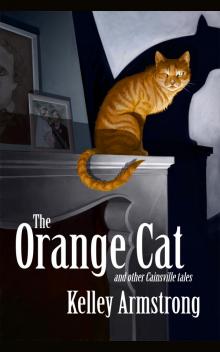 The Orange Cat and Other Cainsville Tales
The Orange Cat and Other Cainsville Tales Darkest Powers Bonus Pack 2
Darkest Powers Bonus Pack 2 Rituals
Rituals Waking the Witch
Waking the Witch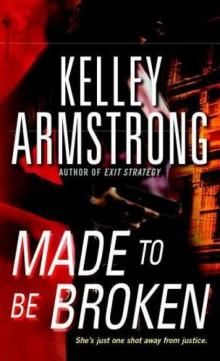 Made to Be Broken
Made to Be Broken Lost Souls
Lost Souls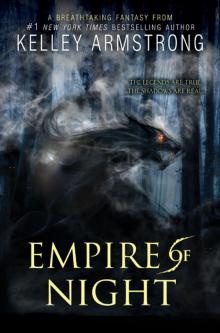 Empire of Night
Empire of Night Wild Justice
Wild Justice Double Play
Double Play Alone in the Wild
Alone in the Wild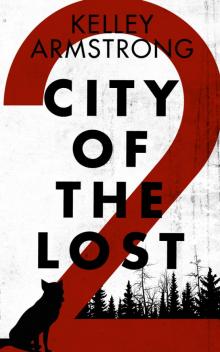 City of the Lost: Part Two
City of the Lost: Part Two A Stranger in Town
A Stranger in Town Watcher in the Woods: A Rockton Novel
Watcher in the Woods: A Rockton Novel Atoning
Atoning Spellbound
Spellbound Wolf's Bane
Wolf's Bane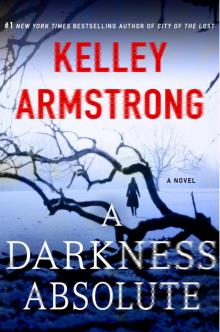 A Darkness Absolute
A Darkness Absolute Ballgowns & Butterflies: A Stitch in Time Holiday Novella
Ballgowns & Butterflies: A Stitch in Time Holiday Novella Wherever She Goes
Wherever She Goes A Royal Guide to Monster Slaying
A Royal Guide to Monster Slaying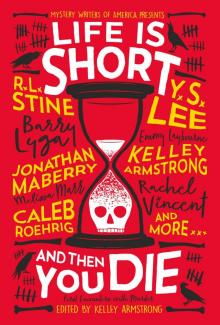 Life Is Short and Then You Die
Life Is Short and Then You Die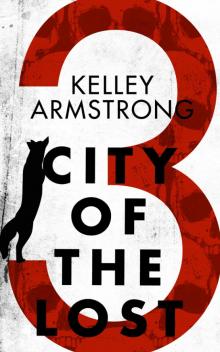 City of the Lost: Part Three
City of the Lost: Part Three Frostbitten
Frostbitten A Stitch in Time
A Stitch in Time Industrial Magic
Industrial Magic Wherever She Goes (ARC)
Wherever She Goes (ARC) Snowstorms & Sleigh Bells: A Stitch in Time holiday novella
Snowstorms & Sleigh Bells: A Stitch in Time holiday novella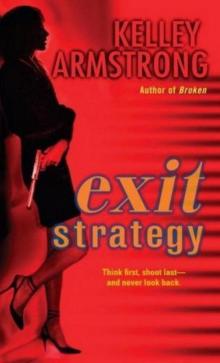 Exit Strategy
Exit Strategy Forest of Ruin
Forest of Ruin Cursed Luck, Book 1
Cursed Luck, Book 1 The Gryphon's Lair
The Gryphon's Lair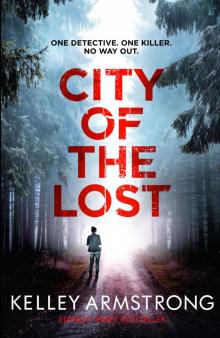 City of the Lost
City of the Lost City of the Lost: Part Four
City of the Lost: Part Four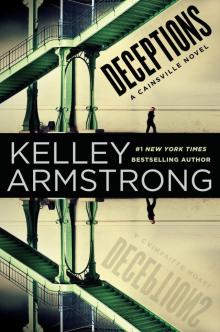 Deceptions
Deceptions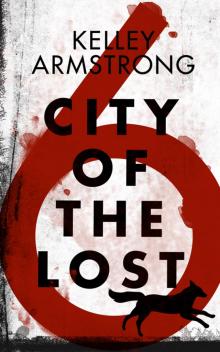 City of the Lost: Part Six
City of the Lost: Part Six Urban Enemies
Urban Enemies Stolen
Stolen Every Step She Takes
Every Step She Takes Portents
Portents Wolf's Curse
Wolf's Curse The Unquiet past
The Unquiet past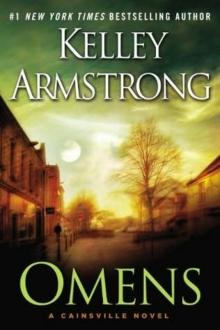 Omens ct-1
Omens ct-1 Cruel Fate
Cruel Fate The Calling dr-2
The Calling dr-2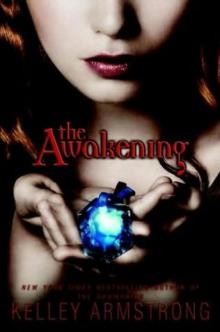 The Awakening dp-2
The Awakening dp-2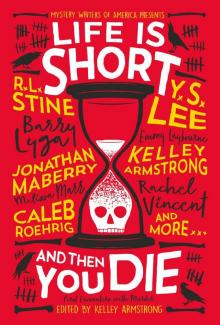 Life Is Short and Then You Die_First Encounters With Murder From Mystery Writers of America
Life Is Short and Then You Die_First Encounters With Murder From Mystery Writers of America Goddess of Summer Love: a Cursed Luck novella
Goddess of Summer Love: a Cursed Luck novella Strangers Among Us
Strangers Among Us The Gathering dr-1
The Gathering dr-1 The Rising dr-3
The Rising dr-3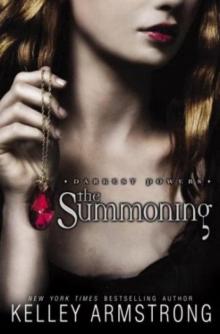 The Summoning dp-1
The Summoning dp-1 The Hunter And The Hunted
The Hunter And The Hunted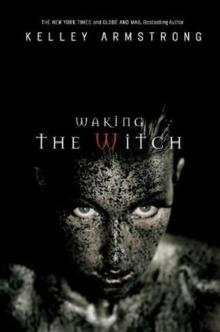 Waking the Witch woto-11
Waking the Witch woto-11